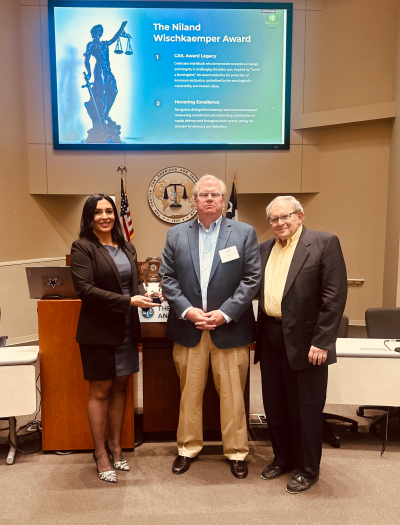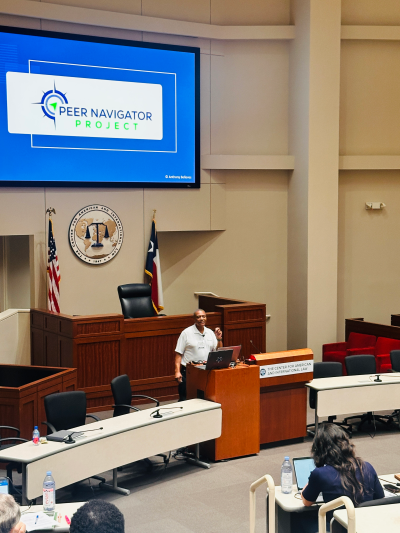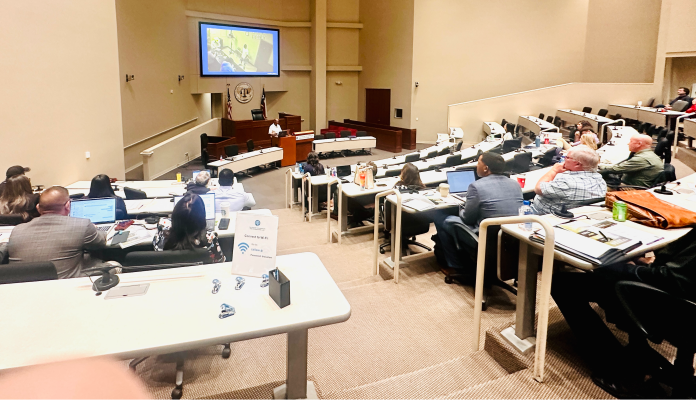For the first time since 2019, the Capital Defense College returned to The Center for American and International Law (CAIL), reaffirming its commitment to equipping attorneys with the knowledge and tools to defend individuals facing the death penalty. Held from March 12-14, 2025, the three-day program brought together 47 participants, offering a dynamic and intensive learning experience. Rooted in CAIL’s Criminal Justice Grant, which was established in the early 2000s to strengthen legal advocacy in capital cases, this year’s program was funded by the Texas Court of Criminal Appeals and featured a lineup of seasoned faculty, innovative topics, and critical discussions on the evolving landscape of capital defense.
Honoring Dedication: The Niland-Wischkaemper Award
A major highlight of the program was the long-awaited presentation of the Niland-Wischkaemper Award, which had not been awarded since 2016. This prestigious honor recognizes attorneys who have devoted their careers to defending individuals facing capital punishment. Edward Ray Keith, from the Regional Public Defender Office for Capital Cases, was named this year’s recipient for his unwavering dedication to justice.
This year’s award held special significance, as Philip Wischkaemper, in whose honor the award is partially named, was originally set to take part in the presentation. His unfortunate passing earlier this year was deeply felt by the capital defense community, as he was a longtime faculty member of CAIL’s Criminal Justice and Actual Innocence Programs and a respected mentor to many. While former CAIL President Mark Smith stepped in to present the award, the moment served as a reminder of Wischkaemper’s lasting impact on the field.

Photo: CJAI Programs director Shannon Evans, Edward Ray Keith, and Mark Smith at the Niland-Wischkaemper Award presentation.
A Story That Must Be Told: Anthony Graves' Keynote
The program also featured a powerful keynote from Anthony Graves, a death row exoneree who was wrongfully convicted and later exonerated. In addition to sharing his personal story, Graves spoke about his ongoing commitment to justice through the Peer Navigator Project, a nonprofit organization he founded to help formerly incarcerated individuals successfully reintegrate into society. His keynote underscored the importance of legal advocacy, not just in preventing wrongful convictions, but in supporting those who have been impacted by the justice system after release.
Photo: Anthony Graves delivers a powerful keynote at the 2025 Capital Defense College, sharing his journey from wrongful conviction to exoneration—and calling for systemic change
Key Takeaways from the Program
The 2025 Capital Defense College covered essential topics such as narrative strategies in court, pre-trial mitigation techniques, appellate issues, and legislative updates. A new addition to this year’s program was the introduction of AI for the Capital Defender, a session led by Felix Valenzuela that explored how attorneys can leverage machine intelligence in case strategy and legal research. This emerging topic sparked important discussions on the ethical and practical applications of AI in capital cases, marking a forward-looking shift in defense strategies.
Photo: Attorneys engage in a packed session at the 2025 Capital Defense College, exploring the evolving legal, ethical, and strategic landscape of capital defense.
Why It Matters
The return of the Capital Defense College after six years underscores CAIL’s dedication to strengthening the legal profession and ensuring fairness in capital cases. Attorneys who attended left with not only new insights and strategies but also a renewed commitment to advocating for justice in the most challenging cases. With thought-provoking discussions, expert-led training, and the long-overdue presentation of the Niland-Wischkaemper Award, this year’s program was a testament to the impact and necessity of capital defense education. CAIL is proud to have revived this essential program and remains committed to supporting those who fight for justice.
